For centuries, humans have been fascinated by the stars and their celestial formations, discovering countless stories and mythologies woven into the fabric of the night sky. One such intriguing figure is Ophiuchus, a lesser-known constellation that holds a significant place in ancient mythology. Despite its relative obscurity compared to the zodiac signs, Ophiuchus has a rich history and symbolism that spans across various cultures and time periods. In this article, we will delve into the origins and symbolism of Ophiuchus, exploring its associations with healing, serpents, and its portrayal in different mythological traditions. Let us embark on a captivating journey through the mysteries of this enigmatic constellation.
Contents
- The Origins of Ophiuchus
- The Symbolism of Ophiuchus
- The Ophiuchus in Different Mythologies
- The Ophiuchus Constellation
- Conclusion
-
Frequently Asked Questions
- 1. Is Ophiuchus part of the zodiac signs?
- 2. What are the dates for Ophiuchus?
- 3. What is the symbolism behind the serpent in Ophiuchus?
- 4. How does Ophiuchus relate to healing and medicine?
- 5. Are there famous personalities born under the sign of Ophiuchus?
- 6. What are the main characteristics of Ophiuchus individuals?
- 7. How does Ophiuchus differ from other constellations?
- 8. Does Ophiuchus have any literary contributions or famous writers associated with it?
- 9. How has Ophiuchus been portrayed in different cultures?
- 10. Can Ophiuchus influence our astrological charts or personality traits?
- References
-
Frequently Asked Questions
- 1. What is the significance of Ophiuchus in ancient mythology?
- 2. How did Ophiuchus come to be recognized as a constellation?
- 3. What are the origins of the Ophiuchus myth?
- 4. What does Ophiuchus symbolize in astrology?
- 5. Is Ophiuchus recognized by modern astrology?
- 6. What role does Ophiuchus play in ancient healing practices?
- 7. What is the symbolism behind the serpent in Ophiuchus?
- 8. Are there variations of the Ophiuchus myth in different mythologies?
- 9. How does Ophiuchus fit into the larger constellation system?
- 10. Can Ophiuchus impact one’s astrological sign?
- References
- Read More
The Origins of Ophiuchus
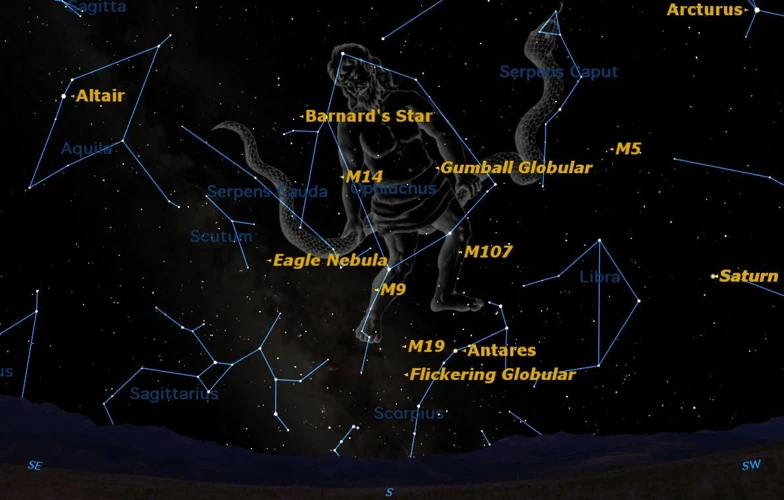
The Origins of Ophiuchus can be traced back to ancient Babylonian and Greek mythology. In Babylonian culture, the constellation was associated with the god Enki, also known as Ea, who was considered the god of wisdom, magic, and healing. Enki was often depicted holding a serpent, symbolizing knowledge and regeneration. The Greeks, influenced by Babylonian astronomy, identified Ophiuchus with the legendary figure of Asclepius, the god of medicine and healing. According to Greek mythology, Asclepius was a mortal who possessed extraordinary healing powers and was known for his ability to resurrect the dead. This association with healing and medicine is a prominent theme in the symbolism of Ophiuchus. The constellation’s name itself is derived from the Greek word “ophis,” meaning serpent or snake. The presence of serpents in the mythological tales surrounding Ophiuchus further enhances its significance. The serpents represent regeneration, transformation, and the dualistic nature of life and death. As we unravel the legends and delve deeper into the mystique of Ophiuchus in ancient mythology, we discover a constellation that carries the essence of healing, wisdom, and the eternal cycle of life.
The Symbolism of Ophiuchus
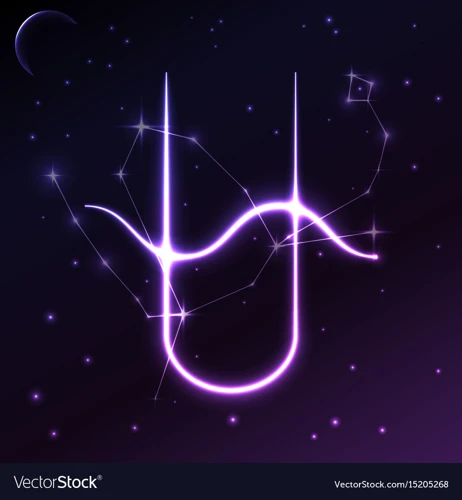
The symbolism of Ophiuchus is deeply rooted in its associations with healing and medicine, as well as serpent imagery. Firstly, Ophiuchus is often seen as a representation of healing and the power of medicine. In Greek mythology, the constellation is linked to Asclepius, the god of medicine, who was revered for his ability to cure sickness and even resurrect the dead. The presence of serpents in Ophiuchus’s symbolism adds another layer of meaning. Serpents have long been associated with wisdom, transformation, and regeneration. The intertwining of serpents in the constellation represents the dualistic nature of life and death and the potential for rebirth and rejuvenation. The symbolism of Ophiuchus, with its emphasis on healing, medicine, and the transformative power of serpents, enlightens us about the profound concepts and values that ancient cultures held dear.
1. Healing and Medicine
The symbolism of Ophiuchus in ancient mythology is intricately intertwined with healing and medicine. In various mythological traditions, Ophiuchus is associated with the god of medicine and healing, such as Asclepius in Greek mythology and Enki in Babylonian mythology. The presence of this constellation in the night sky has long been regarded as a symbol of wisdom, knowledge, and the art of healing. Ophiuchus represents the transformative power of medicine, the ability to restore and rejuvenate the human body. Legends often depict Ophiuchus as a healer who possesses incredible knowledge of medicinal herbs and the power to cure even the most dire illnesses. The symbol of the serpent, commonly associated with Ophiuchus, represents regeneration and rebirth, reflecting the transformative nature of healing. This symbolism is particularly evident in the Greek myth of Asclepius, who was known for his ability to bring the dead back to life through his profound understanding of medicine. The wisdom and healing prowess associated with Ophiuchus can be seen in various cultural traditions and have even inspired famous writers and their literary contributions. For instance, [Famous Ophiuchus Writers] have drawn inspiration from the mythology surrounding Ophiuchus, infusing their works with themes of healing and the pursuit of knowledge. The significance of Ophiuchus in the realm of medicine and healing is not only a reflection of its ancient origins but also a testament to the universal human quest for wellness and the restoration of life.
2. Serpent Symbolism
Serpent symbolism plays a significant role in understanding the deeper meaning behind Ophiuchus. In various mythologies and cultures, serpents have been associated with themes of rebirth, transformation, and healing. In the case of Ophiuchus, the serpent symbolizes the dualistic nature of life and death, as well as the regenerative powers of healing. The intertwining of the serpent in the symbol of Ophiuchus reflects the intricate connection between wisdom and the healing arts. In ancient Greek mythology, the symbol of the serpent entwined around a staff, known as the Rod of Asclepius, has been universally recognized as a symbol of healing and medicine. It is believed to be derived from the story of Asclepius, the Greek god of medicine, and his ability to resurrect the dead. The serpent, shedding its skin, also represents transformation and renewal, further reinforcing the connection between Ophiuchus and the concept of regeneration. Serpent symbolism is deeply embedded in the mythological narratives surrounding Ophiuchus, emphasizing its association with healing, wisdom, and the mysteries of life and death. To explore more about Ophiuchus and its serpent symbolism, refer to the article on Unraveling the Legends of Ophiuchus in Ancient Mythology.
The Ophiuchus in Different Mythologies
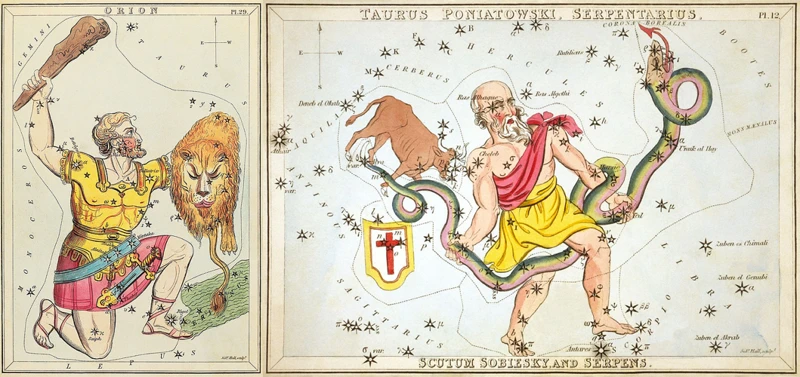
The Ophiuchus constellation holds significance in various mythologies around the world. In Egyptian mythology, it is associated with Imhotep, a revered figure known as the god of medicine and healing. Imhotep was not only a skilled physician but also a talented architect and advisor to the pharaoh. His depiction as a serpent bearer resonates with the healing and wisdom symbolized by Ophiuchus. In Chinese mythology, Ophiuchus is linked to the figure of Huangdi, the Yellow Emperor, who is regarded as the founding father of Chinese medicine. Huangdi was believed to have gained profound knowledge of medicinal herbs and acupuncture from a divine dragon-like creature known as the Qilin. This connection to the serpent-like creature aligns with the serpent symbolism associated with Ophiuchus. Additionally, Native American tribes have their own interpretations of Ophiuchus. The Lakota Sioux tribe considered it to represent the White Buffalo Woman, a sacred figure associated with the teachings of healing and spirituality. The Hopi tribe recognizes Ophiuchus as the serpent deity Avanyu, who brings rain and symbolizes fertility and rejuvenation. These diverse mythological interpretations illustrate the universality of Ophiuchus’ symbolism and its role as a guardian of healing, wisdom, and the harmony between humans and the natural world.
The Ophiuchus Constellation
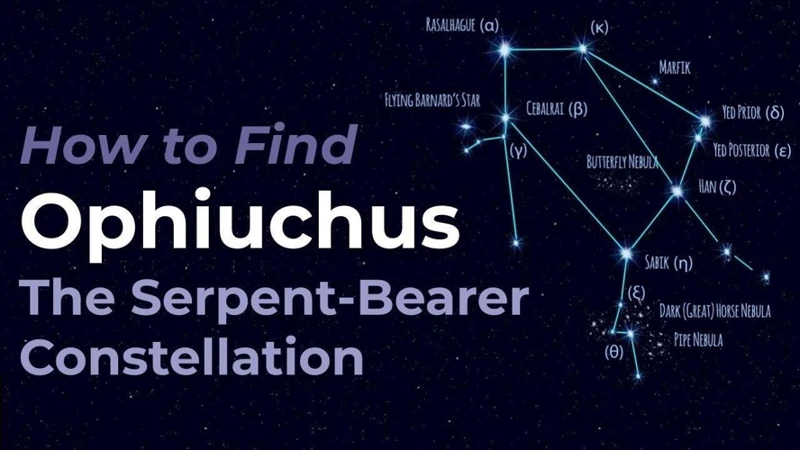
The Ophiuchus Constellation, also known as the Serpent Bearer, is a unique and captivating formation in the night sky. Located near the celestial equator, Ophiuchus is positioned between the constellations of Scorpius and Hercules. It is represented by a figure holding a serpent, symbolizing the mythological origins associated with healing and medicine. The constellation consists of several notable stars, including Rasalhague, the brightest star in Ophiuchus, which translates to “Head of the Serpent Charmer.” Another prominent star is Barnard’s Star, one of the closest known stars to our solar system. Ophiuchus also contains a number of fascinating deep-sky objects, such as the Ophiuchus Cluster, a dense globular cluster of stars located near the border with Scorpius. This cluster is a visual spectacle, offering a glimpse into the vastness and beauty of the universe. Exploring the Ophiuchus Constellation can be an enchanting experience for astronomers and stargazers alike, as they navigate the intricate celestial web and unravel the mysteries held within its cosmic embrace. To learn more about famous personalities associated with Ophiuchus and their literary contributions, you can follow this link.
Conclusion
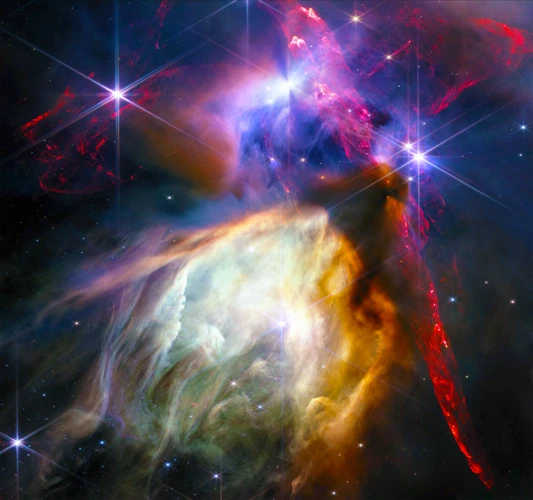
In conclusion, the exploration of Ophiuchus reveals a captivating tapestry of ancient mythology and symbolism. This lesser-known constellation holds its roots in Babylonian and Greek cultures, where it was associated with healing, wisdom, and the enigmatic power of serpents. Ophiuchus, represented by the figure of Enki in Babylonian mythology and Asclepius in Greek mythology, embodies the concept of healing and medicine. The serpent symbolism intertwined with Ophiuchus represents the cyclical nature of life, transformation, and regeneration. While often overshadowed by the twelve zodiac signs, Ophiuchus has a profound significance that transcends cultures and time periods. Its influence can be seen in various mythological traditions across the globe. Exploring the origins and symbolism of Ophiuchus unlocks a deeper understanding of the celestial wonders and timeless tales that have captivated humanity for centuries. For additional insights into the mysteries of Ophiuchus and its impact on famous personalities’ love life, follow the link to Ophiuchus Love Life: Famous Personalities.
Frequently Asked Questions
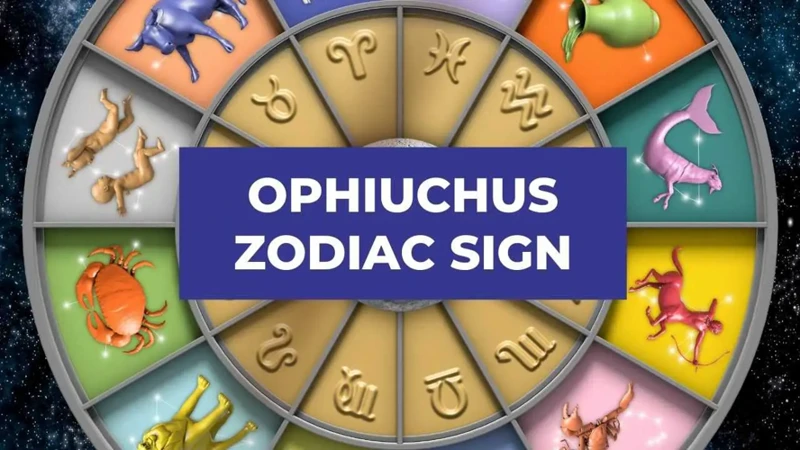
1. Is Ophiuchus part of the zodiac signs?
No, Ophiuchus is not considered one of the traditional zodiac signs. It is often referred to as the “13th zodiac sign” although it does not officially belong to the zodiac wheel.
2. What are the dates for Ophiuchus?
The dates for Ophiuchus are typically November 29th to December 17th. These dates may vary slightly depending on the astrological system being used.
3. What is the symbolism behind the serpent in Ophiuchus?
The serpent in Ophiuchus represents regeneration, transformation, and the duality of life and death. It is a powerful symbol of wisdom and healing, linking Ophiuchus to the realm of medicine and knowledge.
4. How does Ophiuchus relate to healing and medicine?
In various mythologies, Ophiuchus is associated with healing and medicine. It is linked to the Greek god Asclepius, who possessed extraordinary healing powers and was revered as the god of medicine.
5. Are there famous personalities born under the sign of Ophiuchus?
While Ophiuchus is not an officially recognized zodiac sign, there have been claims that famous personalities such as Immanuel Kant and Sir Isaac Newton were born under its influence. However, astrology experts debate the validity of these claims.
6. What are the main characteristics of Ophiuchus individuals?
Individuals associated with Ophiuchus are said to be intuitive, curious, and focused on acquiring knowledge. They are believed to have strong healing abilities and a deep understanding of the complexities of life.
7. How does Ophiuchus differ from other constellations?
Ophiuchus stands out from other constellations due to its association with healing and the intertwining symbolism of serpents. Its connection to medicine and wisdom sets it apart from many other mythological figures in the night sky.
8. Does Ophiuchus have any literary contributions or famous writers associated with it?
Ophiuchus is not widely known for its literary contributions or associations with famous writers. However, the stories and symbolism behind this constellation have provided inspiration for writers exploring themes of healing, transformation, and the pursuit of knowledge.
9. How has Ophiuchus been portrayed in different cultures?
Ophiuchus has appeared in various mythologies, from Babylonian and Greek to Mesoamerican and Egyptian. Each culture has interpreted and portrayed the constellation differently, often emphasizing its healing and transformative qualities.
10. Can Ophiuchus influence our astrological charts or personality traits?
While Ophiuchus does not have a recognized place in mainstream astrology, some individuals may resonate with its symbolism and align themselves with its characteristics. Ultimately, the influence of Ophiuchus on astrological charts or personality traits depends on one’s personal beliefs and interpretations.
References
Frequently Asked Questions

1. What is the significance of Ophiuchus in ancient mythology?
Ophiuchus holds great significance in ancient mythology as it represents the mysterious and powerful figure of a serpent bearer. It symbolizes healing, wisdom, and the balance between life and death.
2. How did Ophiuchus come to be recognized as a constellation?
Ophiuchus was first documented as a constellation by the ancient Greeks. It was included in the zodiac by ancient astronomer Ptolemy in the 2nd century AD, but later removed due to the 12-sign system being more widely accepted.
3. What are the origins of the Ophiuchus myth?
The Ophiuchus myth has roots in various ancient cultures, including Greek, Egyptian, and Mesopotamian. One of the earliest references to Ophiuchus can be found in the myth of Asclepius, the Greek god of healing and medicine.
4. What does Ophiuchus symbolize in astrology?
In astrology, Ophiuchus represents the constellation associated with the 13th zodiac sign. It is believed to govern traits such as healing abilities, transformation, rebirth, and the exploration of the esoteric and hidden aspects of life.
5. Is Ophiuchus recognized by modern astrology?
While Ophiuchus is not officially recognized in traditional Western astrology, some modern astrologers acknowledge its existence and incorporate it into their zodiac interpretations. This has added an interesting twist to astrological discussions and debates.
6. What role does Ophiuchus play in ancient healing practices?
Ophiuchus is closely associated with healing and medicine in ancient mythology. The figure of Ophiuchus represents the knowledge and power to heal, with serpents symbolizing transformation and rejuvenation, key aspects of ancient healing practices.
7. What is the symbolism behind the serpent in Ophiuchus?
The serpent symbolism in Ophiuchus carries multiple meanings. It represents rebirth, wisdom, and knowledge. In ancient cultures, serpents were seen as transformative creatures that shed their skin, symbolizing the cycle of life, death, and rebirth.
8. Are there variations of the Ophiuchus myth in different mythologies?
Yes, variations of the Ophiuchus myth can be found in different mythologies. In Egyptian mythology, Ophiuchus is associated with the god Imhotep, the patron of healers. In Mesopotamian mythology, it is linked to the god Enki, who possesses healing powers.
9. How does Ophiuchus fit into the larger constellation system?
Ophiuchus is a constellation located between Scorpius and Sagittarius in the celestial sphere. It is often depicted as a man holding a serpent, with the snake’s head pointing towards the constellation Serpens.
10. Can Ophiuchus impact one’s astrological sign?
Since Ophiuchus is not officially recognized in traditional astrology, it does not impact an individual’s astrological sign within the 12-sign zodiac system. However, those who embrace the idea of a 13-sign zodiac may interpret Ophiuchus as an additional influence in astrological readings.






